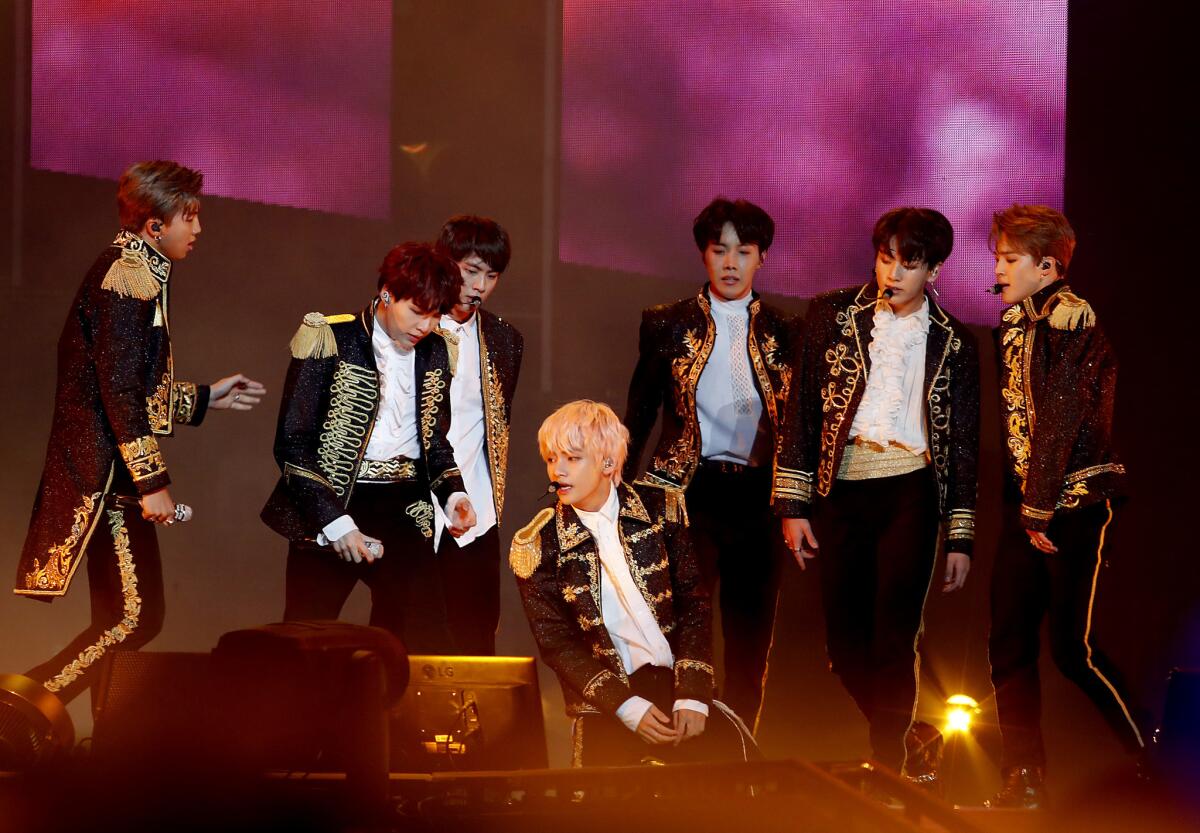Where is K-pop going in 2019?
- Share via
There’s no doubt that K-pop broke through in the United States in 2018.
After years of slow advancement in coastal capitals like Los Angeles and New York, the sleek yet busy sound from South Korea finally reached a mainstream American audience last year thanks to BTS, the seven-member boy band that became the first K-pop group to land an album at No. 1 on the Billboard 200 — then did it again with another record just a few months later.
But what happens after a breakthrough?
That’s the question K-pop is poised to answer in 2019, as some of its biggest stars take up positions in this country’s musical institutions — and others face a troubling sex scandal at home that could threaten the style’s global momentum.
On April 13, BTS will notch another first for K-pop when it performs on “Saturday Night Live” following the release the day before of its highly anticipated new album, “Map of the Soul: Persona.”
That same weekend, Blackpink — a female foursome from Seoul heard last year in a collaborative single with Dua Lipa — will become the first K-pop girl group to play the Coachella Valley Music and Arts Festival in Indio.
What these bookings indicate is the beginning of the second phase of K-pop’s American adventure, in which the music answers its embrace by opening itself up to influences from its new surroundings.
K-pop was shaped from the start by Western sounds. When I sat down with BTS last spring in a hotel meeting room in downtown L.A., the group’s leader, RM, was quick to acknowledge the importance of acts like the Backstreet Boys.
The way he sees it, BTS is “re-exporting” the classic boy-band style “to the rest of the world where we had initially drawn much of our inspiration,” RM said.

FULL COVERAGE: Spring arts preview 2019 »
But much of K-pop’s appeal lies in the way it diverges from that blueprint — in the bold collision of rhythms and textures that defines a song like BTS’ “Fake Love,” for instance, which has a chaotic energy nobody ever got from ’N Sync.
The music’s thrillingly fluid ideas about gender also have distinguished many K-pop acts from their American counterparts. In September at Staples Center, where BTS played four sold-out concerts, the group’s frilly costumes and sensual moves reflected some pretty evolved thinking about pop-star masculinity — certainly beyond what we’re accustomed to seeing in our homegrown teen idols.
Counterintuitively, perhaps, that welcome sense of freedom is the product of a K-pop industry far more rigorously controlled than the American music business.
In response to a question I asked about the meaning of its Coachella appearance, the members of Blackpink said in an email, “To perform at Coachella has been one of our biggest dreams ever since we were trainees” — striking language that pointed to the system by which K-pop artists are carefully groomed for stardom.
Obviously, differences remain between here and there.
Yet American pop has a way of streamlining what it absorbs. You can hear that in Tomorrow x Together, a young quintet assembled by Big Hit Entertainment, the successful Korean company behind BTS.

Spring music picks: Ariana Grande, Vince Staples, Bikini Kill and more »
On its debut EP, which came out this month ahead of an expected trip to the U.S. later in the spring, the boy band echoes Justin Bieber and Boyz II Men; it’s cleverly produced (and as sonically detailed as the most ambitious K-pop) but also feels newly geared to American tastes — one reason that Republic Records, home to Taylor Swift and Ariana Grande, has signed on to promote the group in the States.
It’s unclear to what extent BTS, which will support its upcoming album with a stadium tour that includes shows May 4 and 5 at the Rose Bowl, has allowed its music to creep our way; Big Hit is keeping “Map of the Soul” tightly under wraps.
Might the group try singing in English? In our conversation last year, RM seemed wary of the idea, describing BTS’ Korean lyrics as a core feature of its music.
But anyone tracking K-pop’s crossover knows that, for all its success on social media and on streaming platforms like Spotify, the style has yet to gain a foothold on Top 40 radio, at least in part because of that language barrier. (Yes, “Despacito” demonstrated that American programmers are willing to spin a song not sung in English. But they haven’t jumped on one like that since.)
In its email, Blackpink — scheduled to follow up its Coachella gig with an April 17 date at the Forum — said airplay in this country is “definitely important” because it “allows us to introduce our music to new fans.”
And those new fans are increasingly crucial, given the uproar in Korea over recent allegations that two older K-pop stars had engaged in sexual misconduct including sharing videos of women without their consent.
For some, the disturbing charges have punctured the false promise of K-pop’s squeaky-clean presentation.
But fresh eyes, like those in America, often see what they want.
Twitter: @mikaelwood
More to Read
The biggest entertainment stories
Get our big stories about Hollywood, film, television, music, arts, culture and more right in your inbox as soon as they publish.
You may occasionally receive promotional content from the Los Angeles Times.











